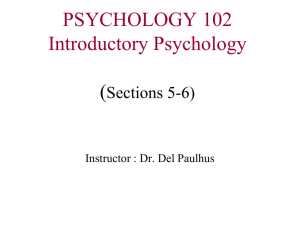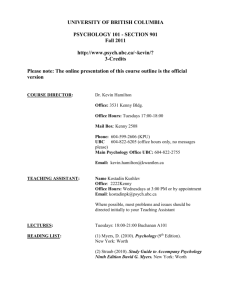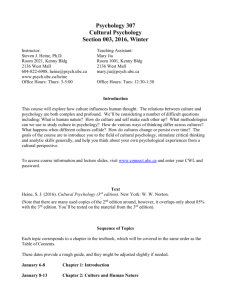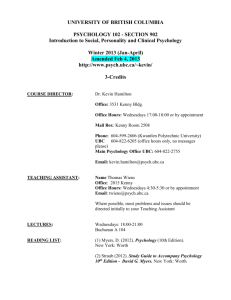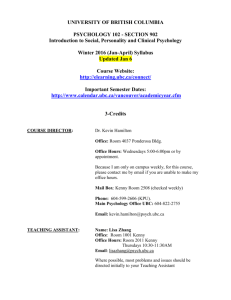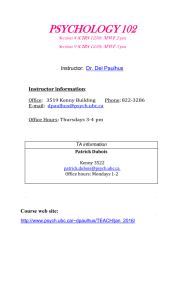UNIVERSITY OF BRITISH COLUMBIA
advertisement
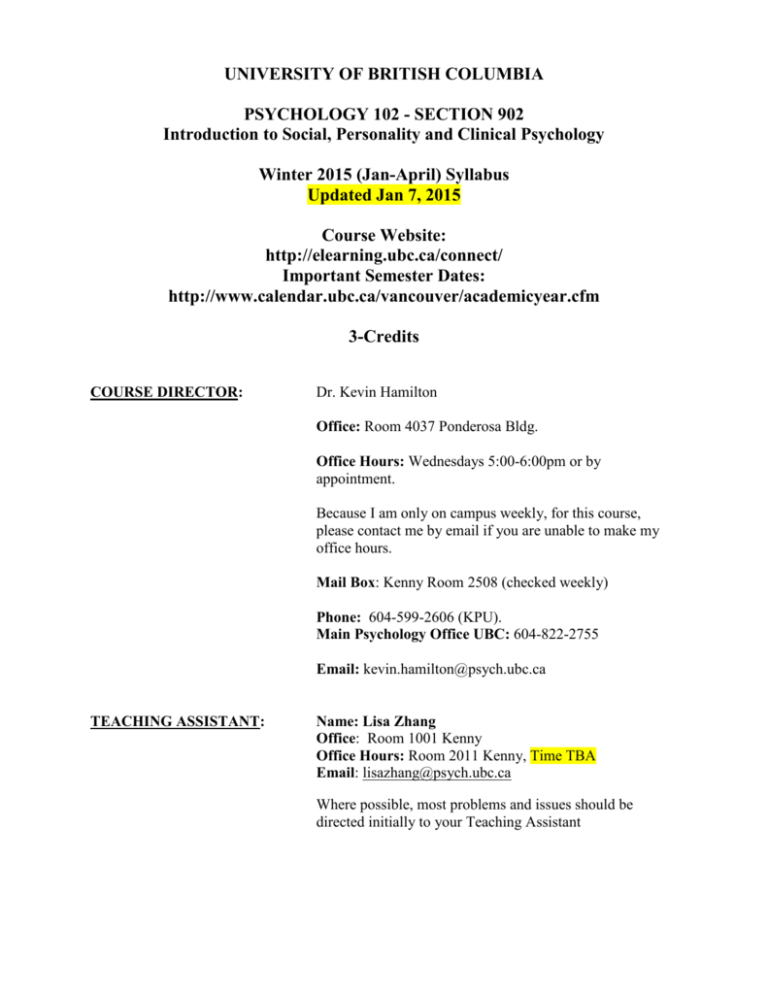
UNIVERSITY OF BRITISH COLUMBIA PSYCHOLOGY 102 - SECTION 902 Introduction to Social, Personality and Clinical Psychology Winter 2015 (Jan-April) Syllabus Updated Jan 7, 2015 Course Website: http://elearning.ubc.ca/connect/ Important Semester Dates: http://www.calendar.ubc.ca/vancouver/academicyear.cfm 3-Credits COURSE DIRECTOR: Dr. Kevin Hamilton Office: Room 4037 Ponderosa Bldg. Office Hours: Wednesdays 5:00-6:00pm or by appointment. Because I am only on campus weekly, for this course, please contact me by email if you are unable to make my office hours. Mail Box: Kenny Room 2508 (checked weekly) Phone: 604-599-2606 (KPU). Main Psychology Office UBC: 604-822-2755 Email: kevin.hamilton@psych.ubc.ca TEACHING ASSISTANT: Name: Lisa Zhang Office: Room 1001 Kenny Office Hours: Room 2011 Kenny, Time TBA Email: lisazhang@psych.ubc.ca Where possible, most problems and issues should be directed initially to your Teaching Assistant LECTURES: Wednesdays: 18:00-21:00 Buchanan A-104 READING LIST: (1) Myers, D. (2012). Psychology (10th Edition). New York: Worth. (2) Straub (2012). Study Guide to Accompany Psychology 10th Edition - David G. Myers. New York: Worth. GENERAL COURSE DESCRIPTION: Psychology is the scientific study of human behaviour. This course promotes critical thinking skills and introduces students to several key areas within mainstream Psychology. Areas discussed are listed under 'Topics and Required Readings' on page 6. The format for the course is one - 3 hour lecture per week, which includes time for discussion and films. COURSE REQUIREMENTS AND EXAMINATIONS: Student Responsibilities: You are responsible for all course readings listed under 'Topics and Required Readings' and for all material presented in lectures that may not be covered in your text. This includes supplemental topics and material presented in films shown regularly throughout the course. Before coming to each class, it is highly recommended that you read the relevant sections in the text to be discussed that day. This will greatly facilitate your understanding of material covered during class. Participation in class discussion is encouraged and regular attendance is extremely important and expected. Students unavoidably absent because of illness or disability should inform the instructor and report to the instructor on returning to class. Course Grades: Your grade for this course is based on 2 in-class exams consisting of both multiple choice and short answer questions (80% and 20% respectively). Together, the exams represent 98% of your overall grade. The 2 exams are not cumulative. Each is on a select section of the course and is worth 49%. The remaining 2% of the course grade is based on a Research Experience Component (REC) organized and managed by the UBC Psychology Department (see details below). Normalizing of Grades: In order to reduce grade inflation and maintain equity across multiple course sections, all psychology courses are required to comply with departmental norms regarding grade distributions. According to departmental norms, the mean grade in a 300-level class is 70 for a 2 good class, 68 for an average class, and 66 for a weak class, with a standard deviation of 13. The corresponding figures for 100- and 200-level Psychology courses are 69, 67, and 65, with a standard deviation of 14. Scaling or grade normalization is likely to be used in order to comply with these norms; grades may be scaled up or down as necessary by the professor or department. It is important to understand that if grade adjustments are made, each student remains in their same position relative to other students in the class. Writing Exams: When writing Exams, please bring a dark pencil (N0. 2 or HB). This is required for machine scoring your multiple choice answer sheets. A pen will be required for short answer questions. Also, you will need picture ID and your student number (found on your library card). Examination dates are indicated below. All exams are 2 hours in duration. If you are interested in viewing your exams please make arrangements directly with your Teaching Assistant. Missed Exams: There are no make-up exams or assignments in this course to improve grades. However, if you miss an exam for legitimate reasons, an equivalent form of the missed exam can be written with your Teaching Assistant when you return to the University. Note, if you are going to miss an exam, you must notify the Teaching Assistant or Course Director within 48 hours of the scheduled exam time. Please make arrangements to write missed exams directly with your Teaching Assistant. A verifiable Doctors note must be provided in order to write an exam outside the scheduled time. Research Experience Component (REC) 2%: Psychology is an active and exciting scientific discipline. As part of this course, you will be asked to complete a research experience component (REC) as way of introducing you, in a more hands on and interactive way, to cutting edge research in psychology. This REC will be worth 2% of your grade and can be obtained in 2 ways as indicated below. You can also augment your overall course grade by up to a 2% bonus through additional HSP participation. 1) Participate in the Psychology Department Human Subjects Pool: Most students will choose to earn their research experience component by spending two hours participating in psychology studies (worth 1% point for each hour) through the Department of Psychology’s Human Subject Pool (HSP) system. You can locate, create an account, and sign up for studies by going to https://hsp.psych.ubc.ca. Please register in the system by the end of the first month of classes to have the opportunity to earn your first ½ hour credit with a brief online survey that will increase your eligibility for more studies. Once registered in the system, you will be able to browse through and select which studies you wish to participate in, sign up for an available timeslot, and confirm your accumulated credits afterward. At the end of the last day of class for the term, the subject pool is closed. At that 3 point, you will no longer be able to receive credits. I strongly urge you to participate in and confirm your credits long before the last week of class. Further instruction on how to use the HSP online system can be found at http://www.psych.ubc.ca/resguide.psy in the document entitled “Subject Pool Information for Participants.” 2) Alternative assignment: Library writing projects: As an alternative to participating in the Subject Pool, you can instead choose to complete two library writing projects (worth 1% point each). For this assignment, you will read and summarize two research articles. You must select a research article (not a letter to the editor, commentary, or review paper) published between 2000-present in the journal Psychological Science – one of the disciplines’ leading journals. Each summary should be about 500 words and should describe the purpose, method and results of the study in your own words. Please see the “Subject Pool Information for Participants” document found at http://www.psych.ubc.ca/resguide.psy for further instructions. If you choose the library option, you must, a) submit your summaries and a copy of the articles no later than 10 days before the end of classes, and b) submit each summary to turnitin.com. If you don’t have a Turnitin account already (from a previous course), you will need to create a user account in Turnitin. For the library assignment the class ID is 2828541, password is library. See www.turnitin.com, and click on the “Training” link at the top of the page for detailed instructions on how to submit papers to Turnitin. Any student who is suspected of plagiarism will, at a minimum, not be granted credit, and their course instructor will be notified. Further action may be taken at a departmental or university level. Academic Dishonesty: Please note that academic dishonesty will not be tolerated at UBC. Cheating, plagiarism, and other forms of academic misconduct are very serious concerns of the University, and the Department of Psychology has taken steps to alleviate them. The Department has implemented software that can reliably detect cheating on multiple-choice exams by analyzing the patterns of students’ responses. In all cases of suspected academic misconduct, the parties involved will be pursued to the fullest extent dictated by the guidelines of the University. Strong evidence of cheating or plagiarism may result in a zero credit for the work in question. According to the University Act (section 61), the President of UBC has the right to impose harsher penalties including (but not limited to) a failing grade for the course, suspension from the University, cancellation of scholarships, or a notation added to a student’s transcript In this course, academic dishonesty pertains primarily to the issue of cheating on exams. Examination protocol is posted on the board in the classroom and reviewed prior to each exam. If you have any questions as to whether or not what you are doing is even a borderline case of academic misconduct, please consult your instructor. For details on pertinent University policies and procedures, please see Chapter 5 in the UBC Calendar (http://students.ubc.ca/calendar). Special Needs: 4 The University accommodates students with disabilities who have registered with the Disability Resource Centre. The University accommodates students whose religious obligations conflict with attendance, submitting assignments, or completing scheduled tests and examinations. Please let your instructor know in advance, preferably in the first week of class, if you will require any accommodation on these grounds. Students who plan to be absent for varsity athletics, family obligations, or other similar commitments, cannot assume they will be accommodated, and should discuss their commitments with the instructor before the drop date. Students have the right to view their marked examinations with their instructor, providing they apply to do so within a month of receiving their final grades. This review is for pedagogic purposes. The examination remains the property of the university. 5 CLASS DATES, TOPICS AND REQUIRED READINGS January 7 - 14 (1) Introduction and Research Methods Prologue: The Story of Psychology Ch. 1 Thinking Critically with Psychological Science January 21 (2) Development Ch. 5 Developing Through the Life Span January 28 (3) Intelligence Ch. 10 Intelligence February 4 (4) Motivation Ch. 11 Motivation and Work February 11 (5) Emotion Ch. 12 Emotion, Stress and Health (p. 458-485) February 18 Reading Break (Feb 16-20) February 25 Exam 1 (49%) Prologue, Ch.’s 1, 5, 10, 11, and 12 p 458-485) March 4 (6) Health Psychology Ch. 12 Emotion, Stress and Health (p. 486-511) March 11 (7) Personality Ch. 13 Personality March 18 (8) Psychopathology Ch. 15 Psychological Disorders March 25 – April 1 (9) Psychotherapy Ch. 16 Therapy April 1: Guest Speaker – Gambling Addictions April 8 (10) Social Psychology Ch. 14 Social Psychology Last class Exam 2 (49%) will be held in the formal examination period from April 14 – 29 (exact date and location of exam TBA) Exam 2 covers Ch.’s 12 (p 486-511), 13,14,15,16 At Exam 2, REC participation credits will be reviewed The last day of classes for the term is Friday April 10 6
